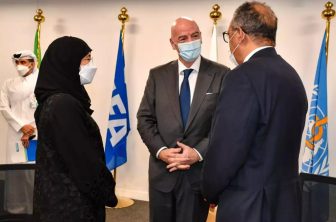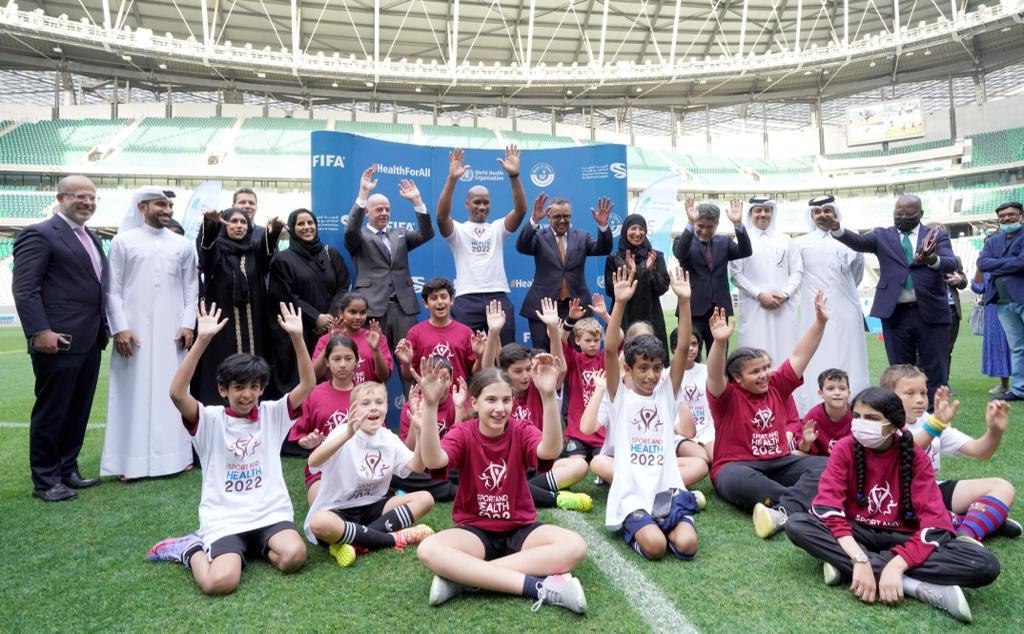The international power of football will be used as leverage to advocate for a healthier way of life.
Officials from Qatar, the World Health Organisation (WHO) and FIFA have agreed, at a senior level, to a series of measures that will boost and protect health during the FIFA World Cup Qatar 2022.
This comes as part of a “unique” international partnership to advocate for a healthier lifestyle, in hopes to gain lessons for future major sporting events.
Initially launched in late 2021, the partnership is overseen by the heads of WHO, Qatar Ministry of Public Health (MOPH), FIFA and the Supreme Committee for Delivery and Legacy. The group met on Friday for their first Steering Committee meeting of the “Healthy FIFA World Cup Qatar 2022 – Creating Legacy for Sport and Health” partnership.
The commitments address the protection of everyone involved in the tournament, with the partners set to ensure the mega event follows precautionary measures to prevent the further spreading of Covid-19.
Another commitment to be fulfilled is the use of the World Cup’s platform as a medium for health promotion. This entails the inclusion of a global campaign to increase awareness around the health benefits of physical activity. Qatar has also signed a three-year agreement with WHO to bolster healthcare access across the country.
As the first international tournament in the Middle East and Arab world, the World Cup in Qatar poses a special opportunity to develop a new method in which lessons from the pandemic blended with sports and health can be deduced.
As such, a blueprint through which future events could follow is also on the list, cementing sports and health as a “pathway for recovery.”
“Our overall goal is not just to hold a successful sporting event, but to also show how football and sports in general can be drivers of better health for all people. This is why we are working so closely with WHO, FIFA and the Supreme Committee for Delivery and Legacy,” noted Dr Hanan Mohamed Al Kuwari, Qatar’s MOPH and Chair of the Steering Committee Meeting.
In the meeting, the Steering Committee leaders agreed to a range of actions which comprised of building on plans decided at the FIFA Arab Cup in late 2021, strengthening health emergency readiness and ensuring the maintenance behind containing the spread of infectious diseases.
Healthy food options will be available inside stadiums and fan zones. They also agreed to enhance tobacco prohibition in those areas.
They will also begin the issuing of collaborative agreements with relevant countries to “benchmark legacy building activities”, as well as exchange points obtained with the International Olympic Committee for Paris 2024 and Milano Cortina 2026.
“This partnership will help to make the FIFA World Cup Qatar 2022 a role model for healthy sporting events,” WHO Director-General Dr Tedros Adhanom Ghebreyesus said.
“It’s important that the first FIFA World Cup in the Middle East will be the healthiest World Cup ever,” stated FIFA President Gianni Infantino.
WHO evaluated accreditation request
A delegation from the Regional Office for the Eastern Mediterranean at WHO examined MOPH’s request for the municipalities of Al-Khor, Al-Wakra, Al-Shahaniya, Al-Daayen, Al-Shamal, and Umm Salal, to attain accreditation for the ‘Healthy City for 2022’ status as well as accreditation from Qatar University as a healthy educational city.

The ‘health city’ programme in Qatar falls in line with its strategic ‘Health in All Policies’, which is embedded within the country’s National Health Strategy 2018-2022.
In February, WHO awarded Doha and Al-Rayyan municipalities with the ‘Healthy Cities’ status and honoured Qatar Foundation’s Education City with ‘Healthy Education City’.
This honorary adoption encouraged local authorities to work towards a clear path under the framework of healthy cities to further submit evaluation requests of six more municipalities and a university.
Follow Doha News on Twitter, Instagram, Facebook and Youtube







